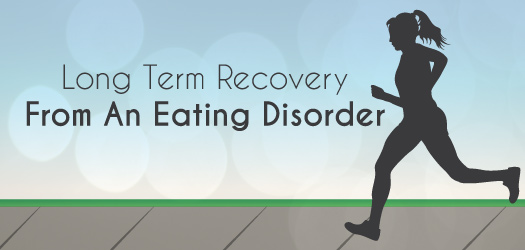- Calls to this hotline are currently being directed to Within Health, Fay or Eating Disorder Solutions
- Representatives are standing by 24/7 to help answer your questions
- All calls are confidential and HIPAA compliant
- There is no obligation or cost to call
- Eating Disorder Hope does not receive any commissions or fees dependent upon which provider you select
- Additional treatment providers are located on our directory or samhsa.gov
Long-Term Recovery from an Eating Disorder
Recovering from an eating disorder involves life-long commitment and dedication to the process. While the phases will vary and change depending on where you may be in your journey, long-term recovery from an eating disorder will continually be a focus throughout your life.

When Is Someone Considered “Recovered”?
Defining long-term recovery from an eating disorder may be difficult to do, with few studies on long-term recovery rates executed over the past decade. It can be challenging to describe recovery from an illness that is both physical and mental by nature.
Different parameters are often used to illustrate recovery.
Recovery from an eating disorder is typically characterized by the full restoration of:
- Physical,
- Nutritional,
- Psychological, and
- Emotional health
For many individuals, this may happen gradually over a period of months, or even years.
The Early Stages of Long-Term Recovery from an Eating Disorder
In the early stages of long-term recovery from an eating disorder, physical and nutritional concerns are often addressed first, as these symptoms are more problematic and can require urgent attention.
These symptoms may include:
- Excessive weight loss
- Malnutrition
- Electrolyte imbalances
- Dehydration
- General deterioration of health
Treatment for Long-Term Recovery
 Treatment in an acute care setting is often needed to address these concerns and before underlying psychological issues can be adequately addressed.
Treatment in an acute care setting is often needed to address these concerns and before underlying psychological issues can be adequately addressed.
As nutritional and physical health is restored, recovery will progress to focus on emotional and psychological concerns that may have fueled the eating disorder in the first place.
This phase of recovery is often completed in a less restrictive setting of care, such as intensive outpatient treatment. In many situations, the emotional and psychological healing often takes much longer than the nutritional/medical stabilization, as many individuals recovering from an eating disorder may be processing deep-rooted issues.
Whatever a person’s unique situation may be, it is important to give oneself the time needed to work through the complex issues at hand.
Staying Healthy in the Long-Term
Years down the road after inpatient and outpatient treatment, constant vigilance is needed to maintain recovery. Eating disorders are diseases that can have both periods of remission and relapse, and managing recovery for the long term is something that requires awareness, determination, perseverance, and mindfulness.
While many individuals who have suffered from an eating disorder will get better, there are aspects of the disease that can persist in varying degrees. The following are some helpful tips for preserving and protecting your recovery throughout the years of your life:
- Understand your triggers: Urges to re-engage in eating disorder behaviors are often associated with particular emotions or events. Are you aware of what these are? Understanding what these triggers are can help you better prepare for the possibility of facing them and the opportunity to practice healthier coping mechanisms in place of the eating disorder.
- Know your support system: If at any point, you feel yourself struggling with eating disorder thoughts or behaviors, voice your concerns to someone who you can trust to support you. Having a regular connection with a trusted individual who understands your history and background can also help provide the support and accountability you need to sustain your recovery.
- Become involved: There are many ways to stay connected to a community that celebrates recovery, such as volunteering for an eating disorder organization, participating in a support group, or joining a mentoring program. Becoming involved in these groups allows one to practice a tangible way of supporting others and yourself in recovery.
- Relapse does not equal failure: Have you experienced relapse in your recovery? Is so, it is important to remind yourself that this does not mean you have failed at recovery. Relapse is often a part of recovery from an eating disorder, but this does not mean your efforts are void. Pick yourself back up and take the steps you need to get back on track.
Early Treatment Interventions
 Individuals with eating disorders, including anorexia and bulimia nervosa, have improved prognosis and better changes for establishing long-term recovery with early treatment interventions [1].
Individuals with eating disorders, including anorexia and bulimia nervosa, have improved prognosis and better changes for establishing long-term recovery with early treatment interventions [1].
For this reason, it is crucial to seek out help as soon as possible, should you suspect that you or someone you care for is dealing with an eating disorder. This applies for relapse episodes as well, in which professional intervention may be needed for support and accountability.
With persistence and dedication, long-term recovery from an eating disorder is possible. You can fully live your life free from eating disorder thoughts and behaviors for years to come, thriving in your recovery.
Recovery from an eating disorder is a difficult and painful journey at times, but it will lead you to immeasurable joy and freedom throughout your life. Remember that you do not need to walk through this journey alone, and having professional support and intervention can help you sustain your recovery for the long-term.
References:
[1]: Clinical Practice Guidelines for Eating Disorders, “Prognosis of Eating Disorders” http://www.guiasalud.es/egpc/traduccion/ingles/conducta_alimentaria/completa/apartado11/pronostico.htmlThe opinions and views of our guest contributors are shared to provide a broad perspective of eating disorders. These are not necessarily the views of Eating Disorder Hope, but an effort to offer discussion of various issues by different concerned individuals.
We at Eating Disorder Hope understand that eating disorders result from a combination of environmental and genetic factors. If you or a loved one are suffering from an eating disorder, please know that there is hope for you, and seek immediate professional help.
Published on June 7, 2017
Edited And Updated By: Crystal Karges, MS, RDN, IBCLC
Reviewed By: Jacquelyn Ekern, MS, LPC on June 7, 2017
Published on EatingDisorderHope.com

